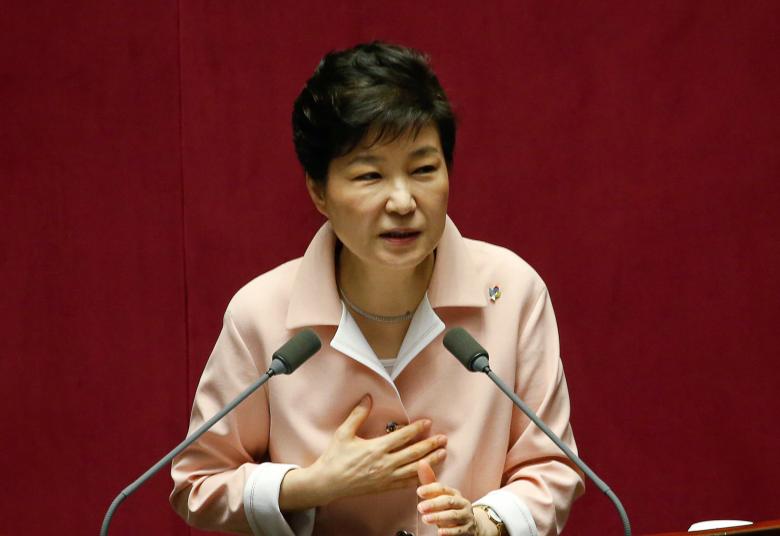South Korea endgame could see Park exiting presidency in disgrace

SEOUL - South Korean President Park Geun-hye faces mounting calls to step down over a political scandal amid indications that parliament, including members from her own ruling party, may try to impeach her.
Three weeks after her first public apology over a political scandal crippling her administration, she faces a narrowing range of options, as she becomes the first sitting leader to be questioned by prosecutors over a criminal case.
"It's now time to consider impeachment," Kim Moo-sung, a former leader of the ruling Saenuri Party and once one of Park's staunchest supporters, said in a statement. She had lost the trust of the people and is no longer capable of continuing as the head of state, he said.
Kim was among a growing number of Saenuri members who have called for her to step down, sensing their leader has become a threat to the party's political survival.
Prosecutors are investigating allegations that Park's confidant Choir Soon-sil used her ties with Park to meddle in state affairs. Choi has been arrested and charged with pressuring chaebol conglomerates to donate $68 million to two foundations she controlled and using her position to get her daughter preferential admission to an elite university.
No South Korean leader in its modern democracy has failed to finish a five-year presidential term. In 2004, parliament voted to impeach then-President Roh Moo-hyun, only to have the motion overturned by the Constitutional Court. The move was unpopular with the public, which saw it as an abuse by the opposition, which had a parliamentary majority.
Political analysts say an impeachment motion against Park could succeed. Impeachment can be initiated with a motion joined by at least half of the members in parliament and needs a two-thirds majority to pass.
"Quite a few of those who are not in the Park faction will likely join in impeaching her, in which case it's pretty likely it will pass," independent political commentator Yu Chang-seon said.
CONSTITUTIONAL COURT
Park's Saenuri Party suffered an unexpected defeat in April's parliamentary elections and lost its majority. It still holds 129 of the 300 seats in parliament.
The case against Park is strong, said Ha Kyung-chull, a former judge on the Constitutional Court.
"And it is likely the Constitutional Court will uphold the impeachment motion if it goes through parliament," Ha, who led a team of lawyers who argued for Roh's reinstatement in 2004, told Reuters.
The main opposition Democratic Party has called for Park's resignation and said it would move to impeach her if she refuses.
The impeachment process, which can take six months or more, is seen as a more likely scenario than Park voluntarily stepping down from power.
Dongguk University political science professor Kim Jun-seok said Park has nothing to gain by stepping down, especially because it could increase her chances of being subject to criminal charges.
If she were to step down, an interim government would be formed around the cabinet headed by the prime minister. A new presidential election has to be called within 60 days under the constitution.
BAN KI-MOON
Analysts say the opposition parties want Park to resign so they won’t have to embark on a fraught impeachment process. If the impeachment motion were to fail, it could lead to a political backlash against them, they say.
If Park does manage to serve out her term, a presidential election will be held in December 2017.
Before the corruption scandal erupted, U.N. Secretary-General Ban Ki-moon, a former South Korean foreign minister, had been the odds-on favourite to be the next president. He had planned to run as a candidate for the Saenuri Party.
The damaged Saenuri would be a less attractive home for Ban, but it may be unrealistic for him to join a new party in the already limited time he has to prepare for a run, even if a vote is not held until the scheduled date in December next year.
Park is daughter of former strong man president Park Chung-hee, who in his 18 years in office crushed protests by political opponents and extended his rule with constitutional amendments. He was shot in the head and killed by his disgruntled spy chief in 1979.
Park has given no indication she intends to heed any pressure to step down. She has tried to limit the damage by firing her closest aides and repeatedly apologising.
Her spokesman Jung Youn-kuk told a briefing on Sunday Park listened "with a heavy heart to the voice of the people" after an estimated 850,000 filled central Seoul on Saturday calling for her resignation. "She is considering ways to normalise state affairs and fulfil her duty as the president," Jung said. -Reuters







